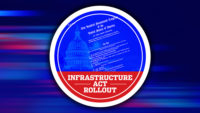With the Infrastructure Investment and Jobs Act now on the books for more than 10 months, the Senate Environment and Public Works Committee is continuing its oversight of how the U.S. Dept. of Transportation is carrying out the law's highway and bridge portions, which account for about 29% of the IIJA's $1.2 trillion in funding.
At a Sept. 21 hearing, committee lawmakers and witnesses representing state and local governments offered mixed reviews for the law's rollout so far. [View a webcast of hearing here.]
All sides embraced the IIJA’s copious highway funding with open arms. They also gave DOT’s Federal Highway Administration high marks for how it has rolled out the law's more than $300 billion allocated to states according to established formulas.
Committee Chair Tom Carper (D-Del.) noted that IIJA's formula funding, which FHWA released just weeks after the IIJA's enactment last November, represents a 34% increase over earlier levels.
But GOP members of the committee and some witnesses found fault or at least room for improvement with other FHWA actions related to the IIJA, including how it is implementing the large number of IIJA programs whose funds are awarded at the department’s discretion.
Sen. Shelley Moore Capito (W.Va.), the committee's top Republican, said she's been told that FHWA "is neglecting to implement certain provisions of the [IIJA], mainly the project delivery sections."
The infrastructure law includes language that codifies a Trump administration executive order that seeks to accelerate federal highway project reviews by, for example, requiring a single federal agency to be designated to take the lead on such reviews.
Capito also criticized U.S. DOT for proposing a regulation to require reductions in highway-related greenhouse gas emissions, even though Congress decided to leave a similar provision out of the IIJA.
West Virginia DOT's Critique
Jimmy Wriston, secretary of the West Virginia DOT, told the committee that the IIJA is "the most impactful transportation law that this country has ever seen."
Wriston said, “I can firmly and confidently predict today, a year from now we will be talking about great successes with the [highway] formula portions of this law.” But he added, “I will just as confidently predict absolute ... failure on the discretionary side.”
Wriston said, "We need consistent [federal] direction. We need consistent guidelines. And we have to be able to understand them."
FHWA has an office in each state. But Wriston said FHWA’s guidance to state DOTs can vary from state to state. "We depend on these federal agencies," he added, saying that his agency looks at federal officials "not only as partners, but advocates for the state.
But Wriston said, "I think they've lost their way."
Looking to the FHWA Nominee
Carper implied that things could improve if the Senate confirms President Biden's nominee to head FHWA, Shailen Bhatt—a former chief of the Colorado and Delaware DOTs.
Just a week earlier, the panel held a confirmation hearing for Bhatt and Carper said committee members were "well pleased" with his testimony.
He indicated he'd like to see Bhatt confirmed "sooner rather than later."
Carper added that the nominee could be helpful in addressing some of the issues Wriston was raising. Bhatt, Carper added, is "pretty good at common sense."
AASHTO Weighs In
Jim Tymon, executive director of the American Association of State Highway and Transportation Officials, praised the IIJA, saying it "lines up well" with AASHTO's priorities, including its five-year length, priority on formula funding and flexibility.
But Tymon sees some needed improvements in federal implementation. He called on U.S. DOT “to simplify the requirements for all of their [IIJA] programs and eliminate as much bureaucratic red tape as possible.”
Tymon also discussed the law's Buy America requirements, saying that some construction materials are not made in the U.S. and advocated for extending a current waiver provision.
He said, “transportation agencies need additional time to integrate these new requirements into their program and project-delivery processes.” Without a waiver extension, Tymon said, “these projects may be delayed and some may even be cancelled."
Inflation also has hampered states’ use of IIJA funds. Tymon said that “huge increases in the cost of construction materials and severe supply-chain disruptions are driving up the cost of projects.
He added that the higher costs "have the potential to wipe out the entire funding increase provided to state DOTs through the IIJA.”
To Ease Inflation's Impact
To ease the inflation impact, Tymon said AASHTO wants Congress to pass a bill that would clarify that states can use funds they received from the American Rescue Plan Act (ARPA) for transportation projects. That measure was signed in March 2021.
That additional funding, Tymon said, could “cover those incremental cost increases that we’re seeing due to inflation."
The Senate passed the legislation AASHTO supports in October of last year, but the House has yet to act on it.
Del. DOT Embraces PROTECT
Delaware DOT Secretary Nicole Majeski said that the IIJA is providing her state $1.6 billion in federal transportation funds, which, when supplemented by state funds. “will allow us to deliver the largest [transportation] capital program to date.”
As a coastal state, the effects of climate change are priority issues in Delaware. Majeski said DelDOT estimates that $1 billion in existing infrastructure “is vulnerable to the impacts of climate change."
She said key IIJA sections for Delaware include a new program called PROTECT, for Promoting Resilient Operations for Transformative, Efficient and Cost-Saving Transportation.
The PROTECT program—which is an unusual combination of formula and discretionary funds as well as IIJA programs dealing with electric vehicles and carbon reduction—will allow Delaware to move “critical projects” forward, Majeski said.
Tucson, Ariz., Mayor Regina Romero told the committee that IIJA is “crucial” to meeting the city’s infrastructure goals, including reconnecting communities and addressing the impacts of climate change.
Romero also said there are “tremendous opportunities” under the IIJA, through such provisions as its funding for electric vehicle infrastructure, clean energy and transit.





Post a comment to this article
Report Abusive Comment